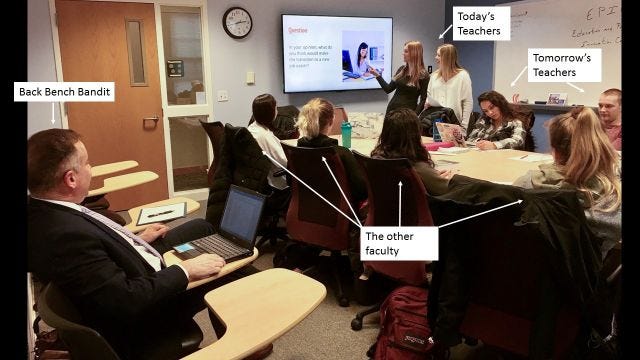RWL Newsletter #111

Greetings from the University of New Hampshire! This morning we had our annual College of Health and Human Services Teaching Conference. I had the opportunity to give a talk about Open Pedagogy and my experience using it in the classroom. You can check out my article about Open Pedagogy in the Journal of Health Administration Education here (it's gated, but if you want a copy, give me a shout, we might be able to work something out...). One of the students took this picture on Wednesday. It's really a privilege to get to work with students in this manner and see how creative and dedicated they are when given the opportunity. (in case it's not obvious, the old guy on the left is me)
This week's links don't really have a theme, but I hope you find them interesting. A little more on gig work, Monty Python on creativity in the workplace, and an interesting talk about managing a distributed workforce. Enjoy!
Read
What: Forbes, Listen To Musicians When They're Not Performing -- They Wrote The Book On The Gig Economy
https://www.forbes.com/sites/michaelbarthur/2019/01/06/listen-to-the-musicians-when-theyre-not-performing-and-learn-to-love-working-in-the-gig-economy/#44cd0c1e73c2
Why: I was at the annual Academy of Management meeting last year and had the opportunity to sit in on a "professional development workshop" (PDW in AOM speak) where early career researchers had a chance to be mentored by senior researchers from the field on a paper the early careerist had written. I was just watching this session, I didn't have anything under review. I happened to be at table where the theme of both papers under critique was "boundaryless careers". There was a humorous but serious British gentleman at the table who was one of the senior researchers offering feedback. I could see his nametag read "Michael Arthur." At some point it occurred to me to flip to the works cited page of one of the papers. There were a half dozen references to Michael Arthur. And I realized at that moment that I was the only one at the table who didn't realize he was sitting with the father of the boundaryless career concept. Anyway, I discovered Michael has a column in Forbes about careers and I've been following it for a while now. This column ties in nicely with the gig theme I had going last week. As a professor at a research university, you have quite a bit of control over your time and this quote resonated with me: "Bill puts it this way. You do a gig (a concert or a show) for one of three reasons: the money, the music or the hang."
I think, even if you aren't a musician or a professor, you have choice in how you spend your time. You may have a variety of factors weighing on you that force you to spend a lot of your time on "the money", but we all have some time available to us that we make choices with. Read the article to find out what he means by the money, music, or hang. It's a cool typology.
Watch
What: John Cleese on Creativity In Management (35 minutes)
https://youtu.be/Pb5oIIPO62g
Why: Cleese, in case you don't know, is a co-founder of Monty Python. He's also moved into the management consulting world. He has a bunch of videos about management topics. This one is about creativity in the workplace. He has a simple but clever idea about creative thinking - open and closed thinking. I really like the way he explains the concept. It makes a lot of sense. And neither mode is right or wrong - it's a matter of when to use each.
This video doesn't really require engaging in it visually, so you can turn it on and let it run while you wash the dishes or whatever. Try the first 15 minutes or so for sure, but the whole thing is very good.
Listen
What: Venture Stories, A Primer on Remote Work and Distributed Teams with Matt Mullenweg and Andreas Klinger
https://www.spreaker.com/user/10197011/a-primer-on-remote-work-and-distributed-
Why: I try not to share links from the same source too closely together, and I know I just shared a story from Venture Stories not too long ago, but this one was really interesting. I've been interested in virtual organizations since the late 90's, and an important part of virtual for me has always been distributed. The participants in this conversation are from the tech industry (surprise!), not healthcare, so the distributed concept is maybe a little easier for them, given the fact that their products are digital, not physical, and so their employees don't have to be in a shared physical space to complete their work. But that said, a lot more of healthcare could (and probably will be) delivered in a distributed manner. Telehealth, in my opinion, is just getting started, and will be a major strategic element of every organization going forward. Healthcare is going to have to embrace distributed workforces eventually.
Thanks for reading and see you next week! If you come across any interesting stories, won't you send them my way? I'd love to hear what you think of these suggestions, and I'd love to get suggestions from you. Feel free to drop me a line by e-mail, or you can tweet to me at @mbonica .
Also, if you find these links interesting, won’t you tell a friend? They can subscribe here: https://tinyletter.com/markbonica
Have a great weekend and do amazing things!
Mark
Mark J. Bonica, Ph.D., MBA, MS
Assistant Professor
Department of Health Management and Policy
University of New Hampshire
(603) 862-0598
mark.bonica@unh.edu
Health Leader Forge Podcast: http://healthleaderforge.org
"I know of no more encouraging fact than the unquestionable ability of man to elevate his life by a conscious endeavor." - Henry David Thoreau


